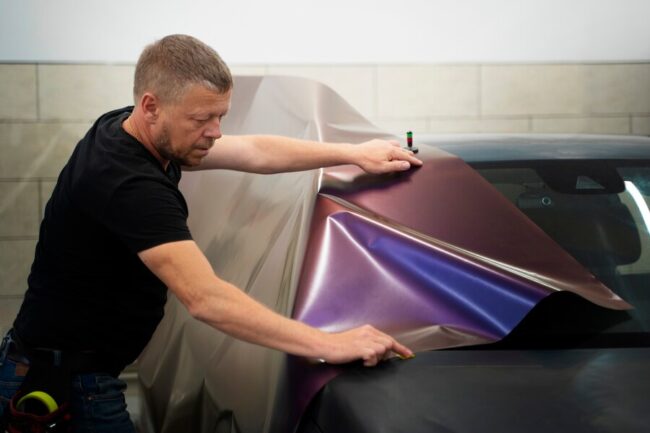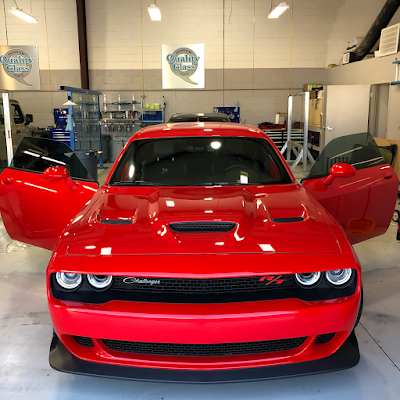In the dynamic world of automotive customization, the ongoing debate between vinyl wrap and traditional paint captivates both enthusiasts and professionals. This choice is pivotal for individuals aiming to elevate their vehicles’ aesthetic appeal, each option presenting distinctive advantages and drawbacks. Vinyl wrap, gaining popularity, offers versatility with a broad palette of colors and textures, enabling unique and eye-catching designs. Moreover, it serves as a protective shield against minor damages, preserving the original paint.
Conversely, traditional paint exudes timeless charm and depth, showcasing artistic craftsmanship. However, the allure comes with a cost, both monetarily and in susceptibility to chips and scratches. This exploration into vinyl wrap versus paint delves into the intricacies of each method, dissecting their pros and cons to guide you in making an informed decision aligned with your aesthetic preferences, budget constraints, and long-term expectations for your cherished vehicle.
Unleashing Creative Expression
Exploring the vast palette of possibilities, vinyl wrap stands out as a dynamic medium for self-expression in automotive customization. With an expansive array of colors, patterns, and textures at one’s disposal, car owners can push the boundaries of creativity and achieve designs that may be impractical or cost-prohibitive with traditional paint. Vinyl wrap empowers individuals to reflect their personalities on their vehicles, transforming them into unique works of art.
Conversely, the enduring charm of traditional paint lies in its timeless allure. While paint may not offer the same breadth of options as vinyl wrap, the depth and richness achievable through meticulous paintwork showcase a different dimension of artistic craftsmanship, appealing to those who appreciate classic elegance over avant-garde designs.
Balancing Budget And Customization
In the realm of automotive customization, the delicate dance between budget constraints and the desire for personalized aesthetics is a critical consideration for enthusiasts and car owners alike. Striking the right balance between financial practicality and the urge for a unique, eye-catching vehicle involves navigating various options and understanding the cost implications of different customization methods.
 Vinyl Wrap: One of the more cost-effective alternatives, vinyl wrap offers a diverse range of colors and designs without breaking the bank. Its affordability makes it an attractive option for those seeking a personalized touch on a budget.
Vinyl Wrap: One of the more cost-effective alternatives, vinyl wrap offers a diverse range of colors and designs without breaking the bank. Its affordability makes it an attractive option for those seeking a personalized touch on a budget.- DIY Approaches: Engaging in do-it-yourself (DIY) customization projects, whether with vinyl wrap or other materials, can significantly reduce labor costs. However, it requires a certain level of skill and patience.
- Professional Paint Jobs: For those willing to invest more in their vehicle’s customization, professional paint jobs provide a timeless and high-quality finish. The craftsmanship involved often justifies the higher cost, appealing to those with a penchant for a refined and polished look.
- Specialized Finishes: Premium finishes, such as metallic or pearl paints, contribute to a luxurious appearance but come at a higher price point. These options cater to individuals with a specific aesthetic vision and a willingness to allocate a larger budget.
Balancing budget and customization aspirations involves a thoughtful analysis of personal preferences, financial constraints, and long-term satisfaction. Whether opting for a budget-friendly vinyl wrap, embracing a DIY project, or indulging in a premium paint job, the key lies in aligning customization choices with realistic budget considerations. By making informed decisions, car enthusiasts can achieve a customized look that not only resonates with their style but also respects the financial parameters they’ve set for their automotive endeavors.
The Battle Against Wear And Tear
In the ongoing struggle to preserve a vehicle’s aesthetic appeal, the resilience of vinyl wrap becomes a pivotal factor. Designed to shield against minor scratches and stone chips, vinyl wrap provides a protective layer that helps maintain the integrity of the underlying paint. This feature contributes significantly to the longevity of the customized look.
On the contrary, traditional paint, though boasting an undeniable aesthetic charm, often succumbs to chips, scratches, and other wear and tear over time. The battle against wear and tear in the realm of paint customization necessitates regular maintenance and repair work to ensure the vehicle’s appearance remains pristine, demanding a commitment to ongoing care and attention.
Eco-Friendly Considerations
As automotive customization enthusiasts explore the endless possibilities of transforming their vehicles, an increasingly vital aspect comes into focus – the environmental impact of the chosen customization method. In a world where sustainability is paramount, the eco-friendliness of vinyl wrap and traditional paint emerges as a critical consideration. Let’s delve into the eco-friendly aspects of these customization choices and how they align with the broader environmental consciousness.
- Vinyl Wrap Materials: The production and disposal of vinyl wrap materials warrant attention. While some wraps contain PVC, a material associated with environmental concerns, newer alternatives like non-PVC and recycled vinyl options have entered the market, offering a more sustainable choice.
- Paint Formulas: Traditional paint, depending on its composition, may involve volatile organic compounds (VOCs) that contribute to air pollution. Water-based and low-VOC paint options have emerged, aiming to minimize the environmental impact associated with conventional paint applications.
- Energy Consumption: Both vinyl wrap and traditional paint processes involve energy consumption during manufacturing and application. Evaluating the energy efficiency of production methods and exploring eco-friendly energy sources becomes essential in minimizing the carbon footprint of the customization process.
In the pursuit of a customized vehicle, it is imperative to balance aesthetic desires with eco-friendly considerations. While both vinyl wrap and traditional paint have their environmental implications, conscious choices in material selection, disposal practices, and energy usage can contribute to a more sustainable automotive customization industry. By staying informed and making eco-conscious decisions, enthusiasts can enjoy the beauty of customization while minimizing their impact on the planet.
Impact On Market Perception
 Beyond personal preference, the choice between vinyl wrap and traditional paint holds implications for market perception when considering resale value. Vehicles with vinyl wraps may appeal to a niche market interested in unique designs and customizable aesthetics. However, the broader second-hand car market may perceive traditional paint as a more conventional and timeless choice, potentially influencing resale value positively.
Beyond personal preference, the choice between vinyl wrap and traditional paint holds implications for market perception when considering resale value. Vehicles with vinyl wraps may appeal to a niche market interested in unique designs and customizable aesthetics. However, the broader second-hand car market may perceive traditional paint as a more conventional and timeless choice, potentially influencing resale value positively.
Understanding the impact of these choices on market perception is crucial for individuals contemplating the long-term investment and potential resale of their customized vehicles, as it involves aligning personal preferences with broader market trends and preferences.
Technology Trends
In the ever-evolving landscape of automotive customization, staying abreast of technology trends is paramount. Technological advancements continually shape the way vehicles are modified, providing enthusiasts and professionals with innovative tools and techniques. From cutting-edge materials to state-of-the-art application methods, technology trends in the customization sphere not only enhance the aesthetics of vehicles but also contribute to efficiency and sustainability.
- Smart Coatings: The integration of smart coatings with responsive features, such as color-changing capabilities or interactive lighting, adds a futuristic dimension to vehicle customization.
- 3D Printing: Emerging as a game-changer, 3D printing enables the creation of intricate and customized parts, allowing for unparalleled design flexibility and precision.
- Augmented Reality (AR): AR applications aid in visualizing and planning customizations, allowing enthusiasts to virtually test various modifications before committing to the actual work.
- Nanotechnology: The use of nanomaterials in paints and wraps enhances durability and provides advanced protection against environmental factors, extending the lifespan of customizations.
- Water-Based Paints: Eco-conscious consumers are increasingly turning to water-based paints, reducing the environmental impact of customization processes.
- Recyclable Wrap Materials: Advancements in recyclable vinyl wrap materials contribute to a more sustainable approach, aligning with the growing demand for eco-friendly practices in the automotive industry.
As technology continues to redefine the boundaries of automotive customization, enthusiasts find themselves at the intersection of artistry and innovation. Embracing these trends not only opens new avenues for creative expression but also underscores a commitment to sustainable and efficient practices. Whether it’s the incorporation of smart coatings or the utilization of 3D printing, the future of automotive customization promises to be a captivating blend of cutting-edge technology and timeless craftsmanship. Stay tuned as these trends shape the next chapter in the ever-evolving narrative of personalized vehicles.
Keeping Your Customized Look Intact
Maintaining the vibrancy and integrity of a customized vehicle’s appearance is a continuous journey, and the chosen customization method plays a pivotal role. Vinyl wrap enthusiasts benefit from relatively straightforward maintenance routines, involving regular cleaning and occasional repairs.
The material’s durability against minor damages helps ensure the longevity of the desired aesthetic. In contrast, the preservation of a painted finish demands meticulous care, including protective measures against environmental factors and prompt repairs for any blemishes. Owners must weigh the convenience of vinyl wrap against the time and effort required to uphold the pristine look of a traditionally painted vehicle, making informed decisions based on their commitment to maintenance.
In the realm of automotive customization, the journey towards realizing your vision is a blend of artistic aspirations and technical precision. At Quality Auto Glass Tint, located at 9110 Fairway Dr, Roseville, CA 95678, our commitment to excellence is unwavering. With a dedicated team of experts and a legacy of over two decades in the industry, we take pride in delivering top-notch services, be it window tinting, paint protection, windshield repair, replacement, or any other glass-related need.
Your vehicle’s aesthetic and functional enhancements are not just services to us – they are a craft. Visit us Monday to Saturday from 9 am to 5 pm, or contact us at (916) 888-8495 or Roseville@qualityautoglasstint.com to learn more about Roseville and embark on a journey of automotive transformation.
Discover the pinnacle of automotive customization with Quality Auto Glass Tint. Contact us today at (916) 888-8495 or Roseville@qualityautoglasstint.com to schedule your consultation. Whether you’re looking to enhance your vehicle’s aesthetics, protect its paint, or ensure crystal-clear visibility through your windshield, our team is ready to exceed your expectations. Visit us at 9110 Fairway Dr, Roseville, CA 95678, Monday to Saturday, 9 am to 5 pm, and let us turn your auto glass aspirations into reality. Elevate your driving experience with Quality Auto Glass Tint – where excellence meets craftsmanship.




